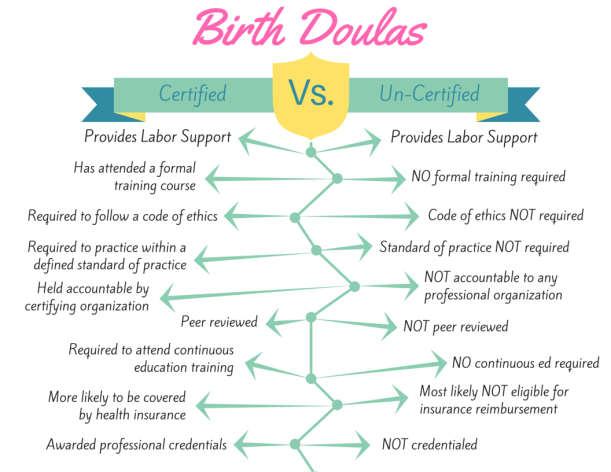I was reading an online discussion recently about the benefits of doula certification. There was some discussion about the fees and how some doulas don’t receive referrals from their certifying body which, by the way, is NOT the point of certification. Then this comment caught my attention:
… where I live most people have no idea what a doula is so certification is irrelevant most of the time.
To me the decision to pursue certification is a no-brainer. Sure it’s challenging, time consuming, and costly, but in my military mind it’s an outstanding weeding out process that separates the professionals from the amateurs. A 2012 article which shows favorable results from continuous labor support is popular among doulas. While it doesn’t distinguish between certified or uncertified doula care, there’s a fun little tid-bit which is often left out that specifically states trained and experienced doula care is best:
Continuous support from a person who is present solely to provide support, is not a member of the woman’s social network, is experienced in providing labour support, and has at least a modest amount of training, appears to be most beneficial. [emphasis added]
But those quotes solidified a belief that I’ve had for a while which is educating the consumer regarding the benefits of CERTIFIED doula support is instrumental in ensuring the birth doula role is:
- Sustainable
- Credible
- Desirable
A solid core of acceptable practices that are held by all doulas not only builds a community of support but more importantly adds credibility to the profession, both in the eyes of medical professionals and peers. This in turn makes certification a desired qualification of consumers who are shopping for doula care…but only if they’re made aware of the benefits. Support, credibility and a market share of women seeking certified doulas makes for a sustainable future. Especially if some hospitals are requiring doulas to be certified and many women are seeking reimbursement from their insurance provider to cover the cost of labor support.
Getting back to that first quote, if you practice in a market where the consumers don’t value labor support and certification, what are you doing to change that? If the family who is shopping for doula support doesn’t hear it from you, the certified doula, then who will they hear it from?
So I decided to do my small part and draft a semi-unbiased comparison of certified and uncertified doulas. Rest assured that what follows is not an opinion piece on why doulas should be certified. I’ve already opened up that can of worms.
Let’s take another look at that infographic and break it down…
Provides labor support
Certified and uncertified doulas both provide support to laboring women.
Trained
A certified doula will always be trained. The uncertified doula may or may not have taken formal training. It’s important to make sure you don’t confuse “trained” with “certified.” Many uncertified doulas will attend training then choose not to certify and advertise themselves as “trained.” There’s a lot more that goes into certification besides taking an approved training.
Code of Ethics (COE)
Most certified doulas are required to adhere to a COE. I say “most” because it depends on the certifying organization. However, uncertified doulas are not required to practice according to a COE. That’s not to say they “don’t” they’re just not bound by any organization to do so.
Standard of Practice (SOP)
My personal favorite, the SOP defines how a doula practices and is often referred to as their “scope of practice.” For example, DONA certified birth doulas are not allowed to perform clinical procedures, which can be anything from a vaginal exam (yes, it happens) to something seemingly simple as taking mom’s temperature. Uncertified doulas are not bound by an SOP. Again, not to say they don’t abide by one, but it’s not required.
Accountable
In addition to their client, certified doulas are accountable to their certifying organization for the way they run their doula practice. Everything from how they treat other doulas to the methods they use while supporting a woman in labor is defined in their COE and SOP. Clients often have an avenue of recourse through the organization if they’re unsatisfied with the certified doulas practices. Uncertified doulas are not accountable to anyone except the client.
Continuing Education
Depending on the organization, certified doulas are required to attend a minimum number of continuing education hours, just like any other professional career field. However, there are certifying organizations that will take a doula’s money and bestow the honorary title of Certified Doula for Life with no continuing education or re-certification requirement, so be wary. Doulas who are not certified, since they’re not required to complete an initial training program in the first place, don’t have to attend continuing education either.
Peer Reviewed
The process of achieving certification and re-certifying with most professional organizations is a rigorous one and for good reason. DONA certified doulas are peer reviewed to ensure they uphold the high standards of the organization. No such requirement exists for doulas who are not certified.
Insurance
Insurance is becoming a big deal lately, so I include it here only to make the distinction that the services of a certified doula are more likely to be covered by the client’s health insurance than the uncertified doula. The certified doula has credentials and the backing of her professional organization to help sway the insurance company’s decision while an uncertified doula is on her own.
Credentials
Like I mentioned earlier, there’s a difference between “trained” and “Certified.” Correction…there’s a HUGE difference. The easiest way to tell if your doula is not just trained but certified is to look for the credentials behind her name.
Different certifying organizations use different credentials, but by far the most common is the title of Certified Doula, which DONA awards as the credential “CD.” So a doula with the letters CD after her name is certified. With DONA as well as some other organizations, the credential is only valid as long as the doula maintains membership with the organization. The certification and re-certification process requires the doula to jump through multiple flaming hoops of death so it only makes sense that the doula stays current in her membership status. If in doubt, ask the doula to see her credential certificate which should have an expiration date.
Doulas who have chosen not to seek certification will use the title “Birth Doula”, “Trained Birth Doula” or “Professional Birth Doula” but they won’t have a credential after their name. They may have taken a formal training and even use that organization’s name in their title in an effort to make it appear more desirable (i.e. “DONA Trained Birth Doula”) but don’t be fooled by fancy titles. Look for the credentials after their name and ask to see their certificate. Certified doulas will gladly show you the fruits of their labor!









Recent Comments